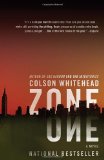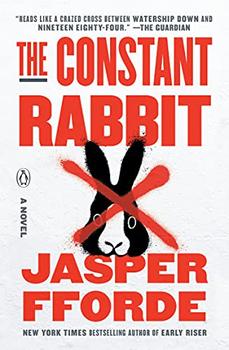Summary | Excerpt | Reviews | Beyond the book | Read-Alikes | Genres & Themes | Author Bio

A Novel
by Colson WhiteheadBoth spine chilling and playfully cerebral, Zone One brilliantly subverts the genre's conventions and deconstructs the zombie myth for the twenty-first century.
In this wry take on the post-apocalyptic horror novel, a pandemic has devastated the planet. The plague has sorted humanity into two types: the uninfected and the infected, the living and the living dead.
Now the plague is receding, and Americans are busy rebuilding civilization under orders from the provisional government based in Buffalo. Their top mission: the resettlement of Manhattan. Armed forces have successfully reclaimed the island south of Canal Street - aka Zone One - but pockets of plague-ridden squatters remain. While the army has eliminated the most dangerous of the infected, teams of civilian volunteers are tasked with clearing out a more innocuous variety - the "malfunctioning" stragglers, who exist in a catatonic state, transfixed by their former lives.
Mark Spitz is a member of one of the civilian teams working in lower Manhattan. Alternating between flashbacks of Spitz's desperate fight for survival during the worst of the outbreak and his present narrative, the novel unfolds over three surreal days, as it depicts the mundane mission of straggler removal, the rigors of Post-Apocalyptic Stress Disorder, and the impossible job of coming to grips with the fallen world.
And then things start to go wrong.
Both spine chilling and playfully cerebral, Zone One brilliantly subverts the genre's conventions and deconstructs the zombie myth for the twenty-first century.
Zone One may not be Whitehead's finest novel, but it's a satisfying, riveting read. The beautifully long, descriptive sentences are richly sensuous, and the languid plot is driven by characters rendered life-like through the author's choice of third-person omniscient narration. Those in love with the written word will most appreciate Whitehead's magic. Lovers of zombie genre novels may find it less appealing. It's a story to be savored slowly, melting on the tongue like fine chocolate. While not a masterpiece, Zone One is a distinct cut above the average and an impressively multi-layered novel that is well deserving of praise...continued
Full Review
(612 words)
This review is available to non-members for a limited time. For full access,
become a member today.
(Reviewed by Lisa Guidarini).
They're the undead dreaded monsters that feast on the brains of the living. But what exactly is the origin of the zombie? No one knows for sure - perhaps it's the Haitian belief that animals can be brought back to life via witchcraft; or maybe it's the jiang shi (reanimated dead body) in Chinese folklore that lives off others' qi or life forces; or what about the evil Dybbuk in Jewish fables that consumes the spirits of lost souls?
 Though a definitive mythology of the origin of zombies isn't entirely clear, these ghastly ghouls - in some form or variation - have been a part of the Western literary tradition for centuries. Mary Shelley's 1818 Frankenstein introduced the idea of harvesting body parts of the dead, and in H.P. Lovecraft...
Though a definitive mythology of the origin of zombies isn't entirely clear, these ghastly ghouls - in some form or variation - have been a part of the Western literary tradition for centuries. Mary Shelley's 1818 Frankenstein introduced the idea of harvesting body parts of the dead, and in H.P. Lovecraft...
This "beyond the book" feature is available to non-members for a limited time. Join today for full access.

If you liked Zone One, try these:

by Jasper Fforde
Published 2021
A new stand-alone novel from the New York Times bestselling author of Early Riser and the Thursday Next series.

by Violet Kupersmith
Published 2015
These stories - based on traditional Vietnamese tales - blends the old world and the new with fantastical, chilling, and original explorations of the ghosts that continue to haunt us: those of the Vietnam War.
I find that a great part of the information I have was acquired by looking something up and finding something else ...
Click Here to find out who said this, as well as discovering other famous literary quotes!